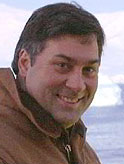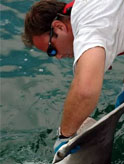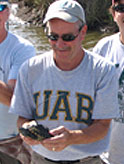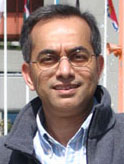ALABAMA
The Alabama Community Forum was held at three locations on Saturday, December 3, 2011:
- Dauphin Island Sea Lab - Dauphin Island
- Auburn High School - Auburn
- Southern Environmental Center - Birmingham
During the free public forum, participants heard from experts on topics that relate to ongoing oil spill research i.e. short- and long-term effects of/on basic oil pollution, marine mammals and fisheries. Following the panel presentation, a short question and answer session followed. You can print the press release for this event here.
Video segments from this event are below:
You can download a printable PDF the PowerPoint presentations that were given by each scientist at the following links:
This program featured the the following experts:

Dr. Ken Halanych |
|
Oil Spill Impacts on Sediment Dwelling Animals in the Gulf of Mexico
Dr. Ken Halanych is an Alumni Professor & Coordinator of the Marine Biology Program at Auburn University. His research focuses on the biodiversity of marine invertebrate animals. His research team received funding through the Marine Environmental Sciences Consortium Gulf Oil Response Initiative to examine sediment dwelling animals in the Gulf using DNA sequencing technologies and to determine the impacts of disturbances like oil spills on their abundance and activity level. Dr. Halanych’s funding will also support training of students in marine biodiversity. |
| |
|
|

Dr. Marcus Drymon |
|
Implications of the Deepwater Horizon Explosion on Alabama's Fisheries
Dr. Marcus Drymon works at the Dauphin Island Sea Lab, the marine research and education facility for the state of Alabama. He is currently conducting research in marine fisheries ecology, particularly for elasmobranch fish. Most of his research is directed towards increasing the effectiveness of management measures for coastal sharks through studies of the distribution, life history and trophic ecology of these fish. Funding received through the Marine Environmental Sciences Consortium Gulf Oil Response Initiative is being used to investigate the impact of the Deepwater Horizon event on coastal shark populations. |
| |
|
|

Dr. Thane Wibbels
|
|
Oil Spill Impacts on Terrapins and Turtles in Coastal Waters
Dr. Thane Wibbels is Professor of Reproductive Biology at the University of Alabama in Birmingham. His research centers on the biology and conservation of reptiles with an emphasis on temperature-dependent sex determination (TSD). The research that he and his students are conducting is multidisciplinary and includes field research with conservation programs for marine turtles, as well as laboratory studies on the molecular physiology underlying TSD. Dr. Wibbels was among nine UAB researchers who received grants from the Marine Environmental Sciences Consortium Gulf Oil Response Initiative for the study of the effect of the Deepwater Horizon Oil Spill on turtles and terrapins that inhabit the salt marshes of Alabama. |
| |
|
|

Dr. Asim Bej |
|
Little Things Rule the World: Microbial Responses to Oil
Dr. Asim Bej is Professor of Microbial Molecular Genetics at the University of Alabama in Birmingham. He studies microorganisms known as extremeophiles, which survive in some of the harshest environments on our planet. He also investigates microbial pathogens, such as those that cause water-borne illnesses. Dr. Bej received funding through the Marine Environmental Sciences Consortium Gulf Oil Response Initiative to study the response of oil-degrading bacteria to the spill. Using test organisms from Antarctica, his team is experimenting with engineering microorganisms to convert hydrocarbon compounds to relatively non-harmful products.
|









